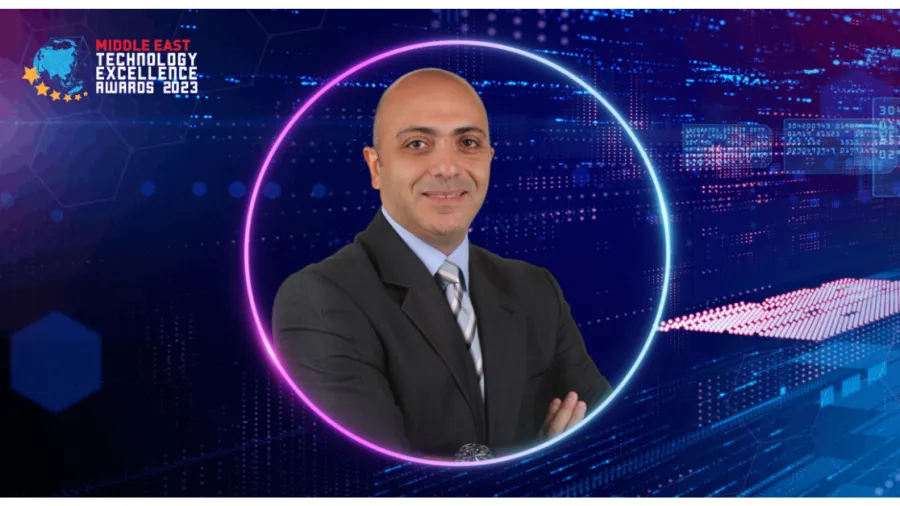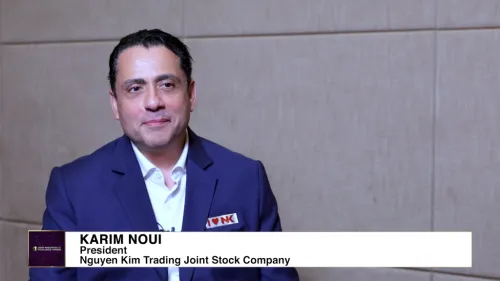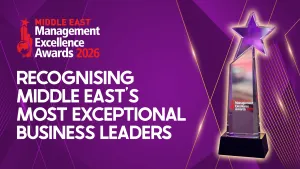
Building Middle East's digital economy sparks innovation, jobs, and environmental benefits, stresses KPMG's Fady Kassatly
KPMG Lower Gulf's Fady Kassatly highlighted the significance of developing the digital economy in the Middle East, as demonstrated by the region's focus on digital investments in recent years.
In an era defined by rapid technological advancements and digital disruption, organisations across the globe are racing to adapt and thrive in the digital landscape. Playing an important role in the Middle East's transformation journey is Fady Kassatly, who spearheads the Digital, Technology, and Innovation business within the advisory practice of KPMG Lower Gulf. With his wealth of experience and expertise, Kassatly has become a trusted advisor to clients across diverse sectors, championing digital transformation programmes and paving the way for groundbreaking innovation.
With an impressive track record in advising both civil and government entities, as well as telecom and NGOs, Kassatly has established himself as a prominent figure in the world of technology-driven strategies. He has supported C-suite executives in navigating large-scale transformation programmes, encompassing areas such as shared services design and implementation, enterprise systems implementations, cloud, customer strategy engagements, as well as organisation design and restructuring.
His expertise also encompasses crucial aspects such as mobile government, smart government initiatives, service modernisation, digital literacy, innovation strategy, and PMO institutionalisation.
Before joining KPMG, Kassatly's journey took him through Strategy Consulting firms and other renowned Big Four organisations. Notably, he served as the leader of the Digital & Innovation practice, focusing on the public sector and telecommunications. Kassatly holds a Master's degree in Management from HEC in Montreal and a Bachelor's Degree in MIS & Finance from McGill University, also in Montreal.
In an interview with Asian Business Review, Kassatly discusses Middle East tech companies' significant progress in digital transformation, emerging technologies that are making an impact in the landscape, and how continuous innovation can help attract skilled talent.
In your opinion, where are the Middle East tech companies now in terms of their digital transformation journeys? Can you share some highlights and lowlights?
Middle East-based tech companies have made great strides to date in driving the digital transformation journey of the region, with some of the biggest regional company names paving the way to disrupting traditional industries and creating new ones.
The technology and digital ecosystems continue to get the attention of the governments in the region and are seeing continued focus and growth. Governments in the Middle East have been investing heavily in digital infrastructure, with initiatives such as Dubai's USD$6 billion Smart City project and Saudi Arabia's Vision 2030 representing the region’s direction. These initiatives aim to create an environment that fosters innovation and supports the growth of the tech industry.
Beyond the large regional investments from global powerhouses such as Microsoft, Google, Amazon, Oracle, SAP, and others, the Middle East also continues to be a thriving tech start-up ecosystem. The UAE, KSA, and other countries continue to emerge as regional hubs in this regard.
In the foreseeable future, Middle East tech companies will continue to push digital innovation in the region and, over the next few years, will continue to see growth, albeit with some potential course correction from time to time as the focus of investments is attuned globally and regionally. Whilst the speed of tech innovation remains very rapid and hard to catch up with in many circumstances, the regional focus on rapid innovation is proportionate to global developments, and in some cases, regional developments and investments in tech are even more aggressive than global standards. That said, the focus is now more on creating value and impact. The days of “let’s build it and they will come” are over. Investors, shareholders, and management are all looking into the ROI and the value being created for all sorts of stakeholders, including government, semi-government, the private sector, citizens, employees, and the larger population within society.
However, despite the growth of the tech ecosystem, the region still faces a shortage of skilled talent, particularly in digital transformation initiatives. This has made it difficult for companies to find the right talent to fill the gaps within their niche services. An additional aspect that the Middle East will likely look towards is the increase in investors willing to take risks and establish a presence in the region. Dubai’s Virtual Asset Regulatory Authority (VARA) and the launch of the recent Generative AI guide are all examples of the UAE’s efforts to create regulatory frameworks for companies to feel supported and protected as they undertake developments around new technologies in the region.
Amidst reports of massive layoffs from tech giants this year, how do you think other tech companies can avoid this occurrence? What areas do they need to improve on or strengthen?
Our research shows that IT budgets are expected to rise in the next few years despite all of the recent global headwinds.
In fact, despite all the recent layoffs from Big Tech, there are still major IT talent gaps to fill, including those for cyber security professionals, developers, data engineers and data scientists, cloud professionals, etc., and the gap is expected to continue growing.
Our research shows that layoffs are not expected to be prevalent across all industries. In fact, these layoffs present an opportunity for other industries to add talent and fill labour gaps that have been persisting for many years. There are many solutions companies should implement to make themselves attractive to these candidates, including continuing to invest in R&D and innovation.
That said, at certain stages, there will be situations where course adjustments are needed as new technology and innovations are introduced and evaluated (e.g., metaverse, generative AI) or as global events take shape (e.g., during COVID, several investments were made and large numbers of people were hired).
In summary, overall investments will continue pouring in, and growth will continue to happen in an evolutionary manner. Talent is the one variable that all organisations should continue to focus on. Whilst there have been layoffs, those individuals with the right skills in terms of technology can adapt, learn, and evolve to be part of the game of the future. Therefore, selecting staff with an appetite for innovation, trying new things, learning, and evolving will always be a winning strategy. The one thing that tech companies cannot afford is to simply stop investing in innovation and progress. This will be the worst decision that could lead to the demise of some companies. It would be critical for tech companies to evaluate and map the maturity and adoption curve of a given technology, especially when it comes to emerging markets. Typically, technology adoption in emerging markets starts with a few early adopters, especially within the public sector or energy, and is then followed by financial services, retail, etc. There is no silver bullet for what the future holds, except to say that one needs to be cognizant of the local market conditions and its propensity to adopt a given technology.
What emerging technologies are making an impact on the Middle East tech landscape? How can these technologies be better utilised?
Generative AI is one of the most notable and transformational technologies that have emerged recently. This area is rapidly evolving, and new breakthroughs and applications are literally being released every week. This needs to be looked at both optimistically and with a bit of caution in terms of its governance and ethical usage. It can be stated with some level of confidence that this technology will impact businesses in more than one way, and it has the potential to literally change existing business models, people’s job descriptions, and open new business opportunities.
KPMG Lower Gulf is building a Center of Excellence jointly with Microsoft in the UAE to find the right level of a balanced approach to leverage this powerful technology by combining KPMG's global and local business, industry, and functional expertise to help organisations create a solid AI strategy, and clearly identifying and defining business use-cases that can benefit from this technology.
Quantum computing is also another area of technology that is expected to transform many industries. By analysing enormous amounts of data, variables, and outcomes, quantum computers will be a game changer for businesses by improving efficiencies and lowering costs. Our research shows that by 2030, the global quantum computing market will grow to $50 billion. Regionally, in 2021, Abu Dhabi announced that it was building its own quantum computer, the first of its kind in the UAE, to help process information at a much faster speed. The computer project, which aims to produce its first simple quantum chips by late summer, is part of a larger UAE plan to develop a “whole stack” of quantum technology.
How important is it to develop the Middle East’s digital economy? What benefits does it provide the region, the organisations, and the people?
The importance of building the Middle East digital economy has been evident through the region’s leadership focus on digital investments over the last two decades. Examples of this are the endorsements of governments such as the UAE and KSA, which are spending billions in tech innovation and enablement programs with very broad socio-economic impacts.
The benefits of this will be felt within the region in a multitude of ways. This will help create: an increase in investments into the region, the creation of jobs, an increase in the relocation of global talent to the region, improved efficiency and return on investments for many organisations that leverage new technologies, improved access to global markets for regional players, improved customer experiences across all industries and improved environmental benefits with the rise of ESG Tech solutions.
As a judge for this year’s Middle East Technology Excellence Awards, what are the qualities that you are looking for in this year’s nominees?
It’s always important to find the movers and shakers that are up and coming in the region, to further enable digital growth. I am looking to find companies that are innovative, risk-taking, have a long-term focus and not just a short-term view, and companies that want to create impact and value as much as create innovation. Good luck to all.


















 Advertise
Advertise







